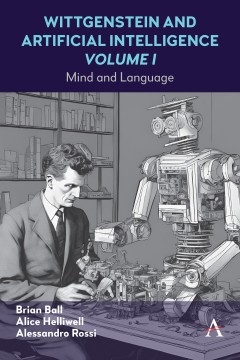The two volumes on Wittgenstein and AI aim to trace and suggest Wittgensteinian influences in some of the most cutting-edge areas of research in Artificial Intelligence (such as Computation, Machine Learning, Natural Language Processing and the use of automation in legal settings). The collection is driven by an essentially interdisciplinary approach, featuring articles from philosophers, computer scientists and legal scholars, writing on a broad range of topics in AI.
The chapters across these two volumes are grouped into two sets of themes: Mind and Language and Value and Governance. These themes correspond to two major areas of research in the philosophical study of AI: the computational mind and the ethics of artificial intelligence. These volumes make a significant and unprecedented contribution to the question of what Wittgenstein’s philosophy can offer to the ever-growing field of AI. It aims to provide insight for both philosophers and non-philosophers alike, offering reflection on the significance of Wittgenstein’s work for AI, and on the implications of advancements in AI technology for Wittgenstein’s philosophy and philosophy influenced by Wittgenstein.
VOLUME I: Wittgenstein and AI (Volume I): Mind and Language. This volume includes chapters on Wittgenstein and Turing’s views on AI, the question of whether machines can think, intentionality, AI language models, analogical reasoning and logic.
Wittgenstein and AI makes for fascinating reading as it engages Wittgenstein’s enactivist philosophy to explore the conceptual and real possibilities of “thinking machines”. Wittgenstein proves an indispensable partner in our attempts to understand and develop the future interaction between humans and machines, their moral status and possible clashes with our human form of life.’ — Danièle Moyal-Sharrock, Professor of Philosophy, University of Hertfordshire; President of the British Wittgenstein Society
‘The exotic mind-like entities now emerging from artificial intelligence bend the conventional categories of analytical philosophy into new shapes, and sometimes threaten to fracture them altogether. Wittgenstein’s critical work is essential for navigating this unfamiliar conceptual territory.’ — Murray Shanahan, Professor of Cognitive Robotics, Department of Computing, Imperial College London, and Principal Research Scientist at Google DeepMind
‘The essays collected in these two volumes amount to the most sustained and up-todate discussion of AI from the standpoint of Wittgenstein’s philosophy. With contributors raising searching questions on a wide range of topics, these volumes will greatly enrich our philosophical understanding of AI and its implications.’ — Mathieu Marion, Professor of Philosophy, Université du Québec à Montréal
Brian Ball is Associate Professor in Philosophy at Northeastern University London. His research spans a range of areas, notably the philosophy of mind, language and artificial intelligence, and he has taught the early history of analytic philosophy, including Wittgenstein.
Alice Helliwell is Assistant Professor in Philosophy at Northeastern University London. Her research is focused on computational creativity and AI art, including questions of aesthetics and ethics.
Alessandro Rossi is Assistant Professor in Philosophy at Northeastern University London. His work focuses on logic, metaphysics and the areas in which they intersect.
Anthem Studies in Wittgenstein
Introduction; Brian Ball, Alice C. Helliwell and Alessandro Rossi; Chapter 1. Wittgenstein and Turing on AI: Myth Versus Reality, Diane Proudfoot; Chapter 2. Between Wittgenstein and Turing: Enactive Embodied Thinking Machines, Tomi Kokkonen and Ilmari Hirvonen; Chapter 3. Wittgenstein, Psychological Language and AI, Arturo Vázquez Hernández; Chapter 4. The Metonymical Trap, Éloïse Boisseau; Chapter 5. The Forms of Artificially Intelligent Life: Brandom, Chomsky and Wittgenstein on the Possibility of Strong-AI, Laith Abdel-Rahman; Chapter 6. Black Boxes, Beetles and Beasts, Ian Ground; Chapter 7. Language Models and the Private Language Argument: A Wittgensteinian Guide to Machine Learning, Giovanni Galli; Chapter 8. Simplification without Falsification: The Problem of Relevance in Logic and AI, Oskari Kuusela; Chapter 9. Modelling Analogical Reasoning: One-Size-Fits-All?, Ioannis Votsis; Notes on Contributors; Index
No links for this title.
No Podcasts for this title.



